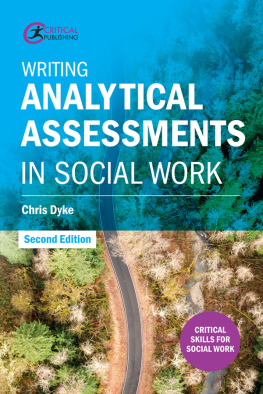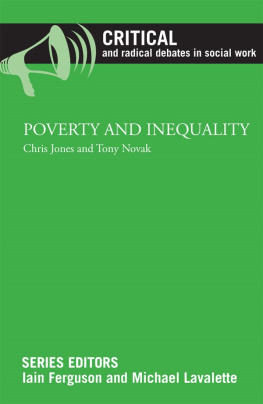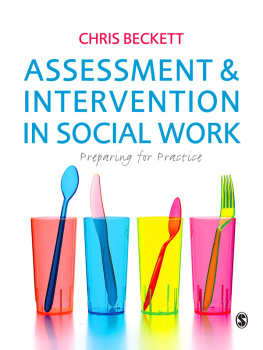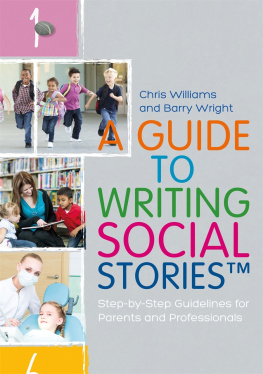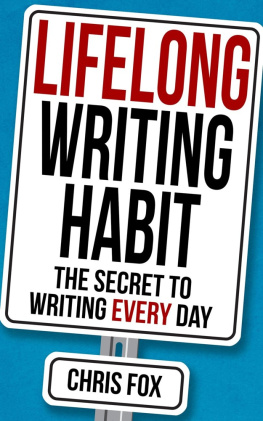
Other books you may be interested in
Active Social Work with Children with Disabilities
By Julie Adams and Diana Leshone ISBN 978-1-910391-94-5
Anti-Racism in Social Work Practice
Edited by Angie Bartoli ISBN 978-1-909330-13-9
The Critical Years: Child Development from Conception to Five
By Tim Gully ISBN 978-1-909330-73-3
Evidencing CPD A Guide to Building Your Social Work Portfolio
By Daisy Bogg and Maggie Challis ISBN 978-1-909330-25-2
Mental Health and the Criminal Justice System
By Ian Cummins ISBN 978-1-910391-90-7
Modern Mental Health: Critical Perspectives on Psychiatric Practice
Edited by Steven Walker ISBN 978-1-909330-53-5
Observing Children and Families: Beyond the Surface
By Gill Butler ISBN 978-1-910391-62-4
Personal Safety for Social Workers and Health Professionals
By Brian Atkins ISBN 978-1-909330-33-7
Positive Social Work: The Essential Toolkit for NQSWs
By Julie Adams and Angie Sheard ISBN 978-1-909330-05-4
Practice Education in Social Work: Achieving Professional Standards
By Pam Field, Cathie Jasper and Lesley Littler ISBN 978-1-909330-17-7
Psychosocial and Relationship-Based Practice
By Claudia Megele ISBN 978-1-909682-97-9
Self-Neglect: A Practical Approach to Risks and Strengths Assessment
By Shona Britten and Karen Whitby ISBN 978-1-912096-86-2
The Social Workers Guide to the Care Act
By Pete Feldon ISBN 978-1-911106-68-5
Starting Social Work: Relections of a Newly Qualiied Social Worker
By Rebecca Joy Novell ISBN 978-1-909682-09-2
Understanding Substance Use: Policy and Practice
By Elaine Arnull ISBN 978-1-909330-93-1
Whats Your Problem? Making Sense of Social Policy and the Policy Process
By Stuart Connor ISBN 978-1-909330-49-8
Titles are also available in a range of electronic formats. To order please go to our website

First published in 2019 by Critical Publishing Ltd
All rights reserved. No part of this publication may be reproduced, stored in a retrieval system, or transmitted in any form or by any means, electronic, mechanical, photocopying, recording or otherwise, without prior permission in writing from the publisher.
Copyright 2019 Chris Dyke
British Library Cataloguing in Publication Data
A CIP record for this book is available from the British Library
ISBN: 978-1-912508-32-7
This book is also available in the following e-book formats:
MOBI: 978-1-912508-33-4
EPUB: 978-1-912508-34-1
Adobe e-book reader: 978-1-912508-35-8
The rights of Chris Dyke to be identified as the Author of this work have been asserted by him in accordance with the Copyright, Design and Patents Act 1988.
Cover and text design by Out of House Ltd
Project management by Newgen Publishing UK
Printed and bound in Great Britain by Bell & Bain, Glasgow
Critical Publishing
3 Connaught Road
St Albans
AL3 5RX
www.criticalpublishing.com
Contents
Our aim is to help you to become the best professional you can be. In order to improve your critical thinking skills we are pleased to offer you a free booklet on the subject.
Just go to our website www.criticalpublishing.com and click the link on the home page.
We have more free resources on our website which you may also find useful.
If youd like to write a review of this book on Amazon, Books Etc. or Wordery, we would be happy to send you the digital version of the book for free.
Email a link to your review to us at , and well reply with a PDF of the book, which you can read on your phone, tablet or Kindle.
You can also connect with us on:
| Twitter | @CriticalPub #criticalpublishing |
| Our blog | https://thecriticalblog.wordpress.com |
Chris Dyke is a social researcher and lecturer with research interests in autism, the effectiveness of professional interventions, the risk assessment of violent offenders, and cognitive biases in assessment.
He worked in residential care, local politics and charities before qualifying as a social worker in 2006, and worked for local authorities until becoming fully independent in 2015.
He likes trying new things, challenging his own assumptions, and finding out hes wrong at least once a day.
The revised edition of Chris Dykes Writing Analytical Assessments in Social Work is essential reading for any professional concerned with undertaking different kinds of report writing, including chronologies, genograms and court reports. This edition moves on from a nuts-and-bolts reader towards a more reflective exploration, not only of which flaws to look out for in writing and analysis, but also why they persist. Drawing on his many years in front-line practice, Chris Dyke speaks to the challenges social workers face in writing analytically in practice. Most importantly, he gets to grips with the day-to-day realities arising for social workers and their managers in conducting assessment and analysis to inform professional judgements and decision-making.
For front-line social workers, elucidating the key factors that underlie problems affecting individuals and families is a key challenge in conducting assessments as well as in writing clear and analytical reports. Not surprisingly, social work students and early practitioners often lack confidence in their assessment and report-writing skills. Writing Analytical Assessments in Social Work therefore has a very important contribution to make in developing the confidence and the critical thinking skills that are key to ethical social work practice.
This book covers the core skills and knowledge required for a wide range of report writing. Each chapter provides a rich source of exercises, case scenarios and vignettes as examples for application of practice that will engage practitioners in an informative way. I particularly like the examples that will enable practitioners to challenge assumptions they may hold and offer insights into how to address the intersecting factors that are at the centre of service users lived experiences. Utilising analytical and theoretical frameworks as tools of analysis, the book invites readers to consider how systems and environmental factors impact assessments. A particular strength is in the pointers that are provided for fostering understandings of the psychological and contextual factors that affect the quality of assessment. The section on language as a tool of oppression is insightful as it will enable practitioners to understand not only the power of language in maintaining dominant discourses, but the importance of being vigilant to the ways unconscious thoughts and feelings can contribute to reproducing inequalities in assessments. Thus, Chris Dyke addresses in a very accessible way the need for assessments that are grounded in an understanding of social inequalities as they manifest in social work. The case is strongly made that practitioners must be mindful of the need for promoting social justice and equality in social work assessments.



